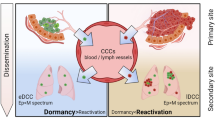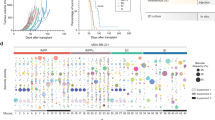Abstract
The bacterial lacZ gene has been used to genetically tag tumor cells. This has been of value, specifically in metastasis research where it allowed to visualize micrometastases and single tumor cells in tissues. lacZ tagging has also provided the feasibility of re-isolating metastatic tumor cell populations for ex vivo molecular analyses. This review summarizes studies that have utilized lacZ tagged tumor cells to understand aspects of metastasis including dormancy, tumor-host interactions, gene modulation and anti-tumor immunity. lacZ tagging is also a valuable tool for evaluating cancer therapies.
Similar content being viewed by others
Author information
Authors and Affiliations
Rights and permissions
About this article
Cite this article
Krüger, A., Schirrmacher, V. & Khokha, R. The bacterial lacZ gene: An important tool for metastasis research and evaluation if new cancer therapies. Cancer Metastasis Rev 17, 285–294 (1998). https://doi.org/10.1023/A:1006066706040
Issue Date:
DOI: https://doi.org/10.1023/A:1006066706040




